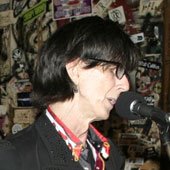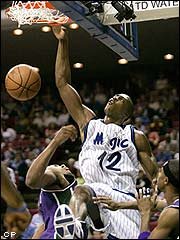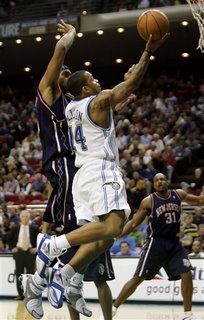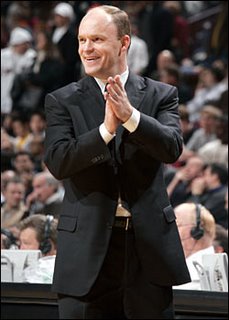 flagging faith in a downtrodden and moribund franchise. I’m singing to none other than the 2005-2006 Orlando Magic. Many people would wonder why I’m professing my love for a team that couldn’t even qualify for the playoffs in the lowly Eastern Conference. Those are the kind of people who have no idea what it’s been like to follow the Magic over the last 6 or 7 years.
flagging faith in a downtrodden and moribund franchise. I’m singing to none other than the 2005-2006 Orlando Magic. Many people would wonder why I’m professing my love for a team that couldn’t even qualify for the playoffs in the lowly Eastern Conference. Those are the kind of people who have no idea what it’s been like to follow the Magic over the last 6 or 7 years.There a few franchises in sports that have been so spectacularly bad (in all phases) over that period of time as Orlando has managed to be. Not only has the product on the court been consistently subpar, but the player acquisition side of things (both through the draft and free agency) may have been worse. Actually, let’s remove all doubt here. It was worse, far worse. I’m not going to relive the managerial blunders of John Gabriel and John Weisbrod here, let’s just say that both of these guys should have Isiah Thomas on their Christmas card list for all that he’s done to deflect attention away from their ineptitude these past two years. For the first time since Shaq left America’s wang for LaLa Land, the Magic are a franchise on the rise with legitimate designs on next year’s playoffs and a run towards an NBA title by the beginning of the next decade. What follows is my outlook for the future of the franchise.
Strategy
The Magic have been in a rebuilding mode before. However, the strategy that this front office is taking is far different from the strategy employed by John Gabriel in the summer of 1999. The Magic’s basic plan of attack at this time was to trade any veteran with an average sized contract and sign a ton of players to league minimum contracts in order to create as much cap space as possible. Don't believe me? Look at this. That was it. There was no backup plan. The Magic pinned every single hope they had for the foreseeable future on the free agent class of 2000. While we’ll never know if this strategy could’ve worked (A special “Thanks” to the Magic team doctors), it’s not hard to see that there were far more ways that it could fail than succeed.
For further proof of the single mindedness of the Orlando front office at this time, one need only look at the case of Chauncey Billups. Despite acquiring Billups for a sack of beans in February of 2000, the Magic actually refused to play Billups one single minute during his time in Orlando. Instead, the Magic deactivated the former #4 pick in the draft and sent him home for the offseason without so much as an audition. Think about that for a second, the Magic had a chance to pair Tracy McGrady and Chauncey Billups together in a backcourt (the following year) and never even gave it a second thought. More than anything, this dependence on the free agency doomed the Magic to a fate of piss poor role players and constant roster turnover. Here’s where the major difference lies in the Magic’s latest attempt to resurrect their franchise. This time around the Magic have the building blocks in place for a successful future already. The task that lies ahead now is to acquire a few more pieces to the puzzle and integrate those pieces into the fabric of a young group of core players.
In what can only be described as “his finest moment”, John Weisbrod set the wheels in motion for much of this with his selections in the 2004 NBA Draft. While many (myself included) were clamoring for Emeka Okafor, Weisbrod saw the tremendous talent and character in a young
 Dwight Howard and made the call to make Howard the draft's #1 pick. In perhaps an even more daring move, Weisbrod later traded for the rights to Denver’s first round pick, Jameer Nelson. Two years later, these two players have established themselves as franchise cornerstones through both their on court play and off the court leadership.
Dwight Howard and made the call to make Howard the draft's #1 pick. In perhaps an even more daring move, Weisbrod later traded for the rights to Denver’s first round pick, Jameer Nelson. Two years later, these two players have established themselves as franchise cornerstones through both their on court play and off the court leadership.Building blocks
It is clear that both Dwight Howard and Jameer Nelson have the necessary talent to help lead a successful NBA franchise. While few doubted Howard’s toughness and freakish athleticism, fewer still would’ve been able to guess that he’d become such a dominating big man this early in his career. While not as offensively skilled as Amare Stoudemire, Howard’s rebounding and defensive prowess already rank among the best in the entire NBA. Nelson, on the other hand was not nearly such a sure thing. Many scouts doubted that Nelson had the size (or even the ability) to be a starting PG in the Association. When Nelson flashed a shaky jumpshot in his rookie year, it fueled further speculation that he was destined for a career as a “sparkplug” second unit PG. Anybody who still holds these ideals as true should have their head examined.
 Nelson is amongst the most improved players in the entire NBA this season, improving his jumper by leaps and bounds, especially his three point shot ( from 31% last year to 42% in 2006), and even becoming a deadly fourth quarter scorer down the stretch this year. I’ve said it here before that I believe Nelson has “poor man’s Tim Hardaway” potential and I’ve got to say that I may have shot a little low with my expectations. If he continues to improve over the next few years, you’re looking at a possible NBA All-Star.
Nelson is amongst the most improved players in the entire NBA this season, improving his jumper by leaps and bounds, especially his three point shot ( from 31% last year to 42% in 2006), and even becoming a deadly fourth quarter scorer down the stretch this year. I’ve said it here before that I believe Nelson has “poor man’s Tim Hardaway” potential and I’ve got to say that I may have shot a little low with my expectations. If he continues to improve over the next few years, you’re looking at a possible NBA All-Star.While the development of these two players has been crucial to the fate of the Orlando franchise, it is the development and acquisition of numerous other players that has placed the Magic squarely on the precipice of the NBA’s promised land. We all know about the Magic’s trade for Darko Milicic. What nobody really knew was if the young Serb could play. By they way, doesn’t “Young Serb” sound like some indie band’s name. Yet, I digress. The answer, we would quickly find out was a resounding “Yes”. While he may never live up to the hype that accompanied his #2 selection in the 2003 NBA Draft, or the legacy of those drafted around him, Darko has proven himself a skilled and capable player in his short tenure in Orlando. He possesses a feel for the game few young big men have that allows him to handle and pass with aplomb (both in the high/low post and the open floor). He has range that extends just beyond 18 feet and possesses an inate sense of timing when going after opponents’ shots. Additionally, and perhaps most importantly, Darko’s natural high post game is seemingly the perfect ying to the yang that is the bruising down low game of Howard. I commented earlier this year that I’d be happy if Darko could become Primoz Brezec. After what I’ve seen over the last 30 games, that is no longer an acceptable ceiling. He can be a far better player than that and, I believe, will become one as his confidence and game experience continue to grow.
Beyond Darko, the Magic have assembled a cast of young role players that seem to fit very well with one another. A cast that is (for the most part) still full of potential for growth. Below is a list of players, and their individual roles whom the Magic would be wise to continue to build around/with:
Hedo Turkoglu: Came into his own after the Steve Francis trade, after which both he and Nelson became the “go-to guys” for the Magic offensively. Once a stand still jumpshooter, Turk now possesses a varied game that gets him to the line and exploits the matchup problems that his 6’10” height creates. Future role: Third option offensively as the starting small forward.
Carlos Arroyo: Most popular Magic player who has enabled the franchise to finally connect with the sizeable Puerto Rican population in Central Florida (the second highest PR total anywhere other than NYC). His aggressive, confident approach on offense brings an energy to the team and provides the Magic with some much needed creativity and scoring off the bench. Future role: Basically the same. Coming off the bench allows him to play the natural style that he has played for so many years on the Puerto Rican national team and while in college.
Keyon Dooling: Instant offense. A two guard in a point guard’s body, Dooling injects the Magic with athleticism and toughness off the bench. Dooling possesses the ability to score in bunches with his streaky shooting and wild forays to the basket. Future role: Sixth Man. If Dooling accepts this role, he could become one of the more feared second unit scorers in the league. Besides his explosive ability, Dooling also seems to play without fear, constantly challenging bigger players on both the offensive and defensive ends. With continued improvement, Dooling could certainly be a better version of Antonio Daniels.
DeShawn Stevenson: The best perimeter defender on the roster, Stevenson has emerged
 within the last season and a half as a player willing to subjugate his own offense for the good of the team. While many would label Stevenson as a “bust” (in comparison with many of his fellow high school entrants), this assessment is far from the reality. Stevenson has emerged as one of the better one-on-one defenders in the entire NBA and also proved himself as one of the toughest by playing through nearly the entire season with a partially torn ACL. As recently as Saturday evening, Stevenson further proved his growing defensive prowess by holding Allen Iverson scoreless over the final 10:41 of the Magic’s win over Philadelphia. Future role: This is a little tricky. One of Arroyo, Stevenson, and Dooling will have to go at some point. The Magic desperately need a high scoring two guard and there isn’t enough room on the roster for these three with an elite shooting guard on Orlando’s roster. If Dooling can mold himself into an semi-adequate second team PG (he would still need to look for his offense plenty) then Stevenson probably stays on as the defensive stopper off the bench as Arroyo is traded to make room on the bench for Stevenson. If not, then Stevenson probably ends up as a 12-15 ppg fifth wheel on a team in need of defense and toughness from their two guard.
within the last season and a half as a player willing to subjugate his own offense for the good of the team. While many would label Stevenson as a “bust” (in comparison with many of his fellow high school entrants), this assessment is far from the reality. Stevenson has emerged as one of the better one-on-one defenders in the entire NBA and also proved himself as one of the toughest by playing through nearly the entire season with a partially torn ACL. As recently as Saturday evening, Stevenson further proved his growing defensive prowess by holding Allen Iverson scoreless over the final 10:41 of the Magic’s win over Philadelphia. Future role: This is a little tricky. One of Arroyo, Stevenson, and Dooling will have to go at some point. The Magic desperately need a high scoring two guard and there isn’t enough room on the roster for these three with an elite shooting guard on Orlando’s roster. If Dooling can mold himself into an semi-adequate second team PG (he would still need to look for his offense plenty) then Stevenson probably stays on as the defensive stopper off the bench as Arroyo is traded to make room on the bench for Stevenson. If not, then Stevenson probably ends up as a 12-15 ppg fifth wheel on a team in need of defense and toughness from their two guard.I’ve reserved judgement of Trevor Ariza and Mario Kasun because I’ve yet to see enough of either of these guys to make a definitive judgement of their ability to contribute to the Magic in the future.
One thing that should be noted, there isn’t a player on the Magic’s roster that I’ve mentioned in this column older than 26 (Arroyo).
Loose ends
Keep Howard happy: The Magic have to continue to work to surround Dwight Howard with not only good players, but also good people. He is the key to any success that the Magic hope to experience over the next decade. Furthermore, if the Magic manage to lose Howard to free agency at any point in that span it will effectively spell the end of the franchise's time in Orlando. You can’t lose three superstars, three franchise players for that matter in 15 years and expect the crowds to keep coming back. If the Magic lose Howard, Orlando will lose the Magic.
Keep the owners happy: Another move that the Magic must make is the construction of a new arena. The TD Waterhouse Centre is among the oldest in the NBA, and almost completely devoid of luxury boxes. In a small market like Orlando, the revenue stream provided by said luxury boxes is of vital importance. If the Magic are to hope to continue to lure crowds (and free agents) to the Magic Kingdom, then the fans are going to have to bite the bullet and shell out some cash for a new arena.
Piss off the Hill family: Despite my objections, the Magic brought Brian Hill back for a second go-round as the team’s head coach this year. While many thought that this was nothing more than an apology for the way that Hill exited Orlando the first time, he proved himself to be a more than adequate leader during a year full of tumult and upheaval. He established a level of professionalism that eventually led to the dismissal of malcontents (Francis) and lazy bastards (Kelvin Cato). He juggled the need to integrate young talent (Darko, Dooling) with the natural instincts of a coach (ie: winning at all costs). All in all, he did as good a job as can be expected given the circumstances. He should remain as the Magic’s coach while this team grows and learns how to win consistently against the NBA’s elite. However, if this franchise is going to ascend to the top of their conference, it is going to need a higher level of coaching expertise (both X’s & O’s as well as psychologically) than I believe Hill possesses. The other factor at play here is the
 “burnout factor” that exists amongst NBA coaches and their teams. Eventually teams will begin to tune a coach out after he’s been around them long enough. Sadly (for him), this is how I see it playing out for Hill. If the Magic are to ever become one of the league’s elite teams, it will have to be without Hill. Finally, while I’m getting waaaay ahead of myself here, here’s a name to remember when that day comes…Scott Skiles. He’s a very good coach whose hard driving style is eventually going to lead him to an exit from Chicago. He was a fan favorite in Orlando during the early expansion years and still has a number of friends within the Magic organization. By my (admittedly shaky) estimates, Skiles should wear out his welcome in the Windy City just around the time that the Magic are ready for a fresh outlook (and voice) to lead them back into the NBA’s nobility.
“burnout factor” that exists amongst NBA coaches and their teams. Eventually teams will begin to tune a coach out after he’s been around them long enough. Sadly (for him), this is how I see it playing out for Hill. If the Magic are to ever become one of the league’s elite teams, it will have to be without Hill. Finally, while I’m getting waaaay ahead of myself here, here’s a name to remember when that day comes…Scott Skiles. He’s a very good coach whose hard driving style is eventually going to lead him to an exit from Chicago. He was a fan favorite in Orlando during the early expansion years and still has a number of friends within the Magic organization. By my (admittedly shaky) estimates, Skiles should wear out his welcome in the Windy City just around the time that the Magic are ready for a fresh outlook (and voice) to lead them back into the NBA’s nobility.
14 comments:
Darko
Darko
Darko
I read something about Stevonson opting out of his contract this off season in search of riches. If he can keep his head on straight he'll be a better version of Bruce Bowen (more athletic, better offensively). If he can't see what's going on in O-town and doesn't want to stick around, maybe they should let him walk. Like you said, you don't want bad eggs on a young team.
Darko and Howard could replace the Wallaces as the most defensive dominating 4/5 combo in the NBA. Eventually.
The one problem with the Stevenson-Bowen comparison is the awful jumpshot of Mr. Stevenson. I have know idea how it's never been corrected/tinkered with. He leans back and seems to shoot it on the way down. He is infinitely more skilled in every other aspect of the game than Bowen, however he struggles to spread defenses with his perimeter jumper (or lack thereof).
I can't see the Magic breaking the bank to re-sign him. Hopefully they wouldn't want to use so much of their cap space yet. They still have to re-sign Darko at some point (presumably next year after a longer audition...mid-season?)and will need to preserve most of the rest of that cap space for a perimeter scorer.
As they mature, Howard and Darko could/should become the best defensive tandem (at least as shot blockers) in the NBA. I think you'll see Darko listed at the "5" and Howard as the "4" in order to placate Howard. He fancies himself more of a "4" in the mold of Duncan and/or Garnett. It's really just for show, but they MUST do whatever they can to continue to keep Howard happy in Orlando.
I agree on both counts...and JamLando made me laugh.
I think John Weisbrod is being considered for the GM of some equally horrible NHL franchise -- either the Islanders or the Bruins.
At least Weisbrod has actual experience in the sport of Hockey. Weisbrod's hire was like hiring Nick Anderson as GM of the Atlanta Thrashers...I'm still not sure how it ended so badly.
The Mobley trade was the official "beginning of the end" for Weisbrod. Up to that point,some people were still believing that he had any clue what he was doing. Once the Magic went in the tank (for both on AND off court reasons), it effectively spelled the end of his tenure.
While I am reticent to give Weisbrod credit for much, and though it was a completely unintentional byproduct of the T-Mac trade, the Magic organization could be in a much worse spot if he hadn't run T-Mac out of town. His back is sooo bad and unpredictable these days that the Magic would be in a similar "held hostage by a star player's injury and enormous contract" situation to what they've been through with Hill over the past 6 years.
Greg,
How's the knee? Are you going to be able to play rugby still? As your agent, this situation concerns me.
Happy 4-20 chief...
I'll probably mention it in my post tommorrow but why not do it twice. Does anybody else find especially ironic that 4/20 and the first day of the NBA Offseason are the same day this year. What's a rough % of the non-playoff participant NBA players who are lighting up today? 75, 80%? I'm probably being too conservative.
Oak says it's 91%...
Even if somebody doesn't have basketball experience, how hard is it to run an NBA team? Basketball is so easy to understand and evaluate. It's not like football, which actually requires a ton of expertise and time watching film. A good sports fan can watch a basketball player for a few minutes and figure out how good he is. I really believe that a smart guy who knows a lot about sports could be a pretty successful GM. The only difficult thing is the salary cap.
It's been done already. It was one of those websites that had a ton of salary cap info and the application that can test whether a trade is allowable within the cap. They sell a professional version to a bunch of teams. Great success story.
Oh and...."Shooby dooby doo wop yeah.....Magic...."
Awesome! I've always hoped I could make extra money! Then I can acheive my dreams of home ownership, boat ownership, and event attendance!
Post a Comment